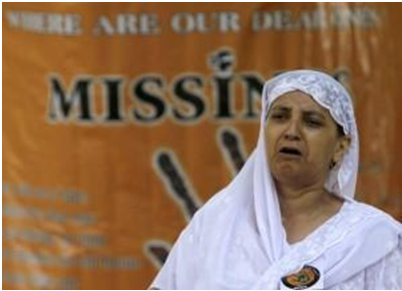"Imran! have you returned?"
The search continues'..

“The Half Mother” a novel by Shahnaz Bashir is an addition to the several books written on the Kashmir conflict so far. It focuses on what is becoming a central theme on the journey of mother Haleema, searching for her son Imran, who was picked up by the Army one night and has never been seen or heard from since.
The book is graphically written, with a passion that transports the reader into the emotional world of the mother searching for her son. Her suffering strikes a chord and opens a window into the psychological trauma women in such situations face. It is not just the physical suffering, but the mental trauma undergone by the courageous, steadfast and bold Haleema.
An incident when Ab Jaan, father of Haleema is killed in front of her, as he argues with an Army major shatters her world. History in a sense repeats itself when the same army major later picks up her son, destroying whatever equilibrium she had managed to gain through the years for herself and her family.
The author has beautifully shown how every family in the Kashmir Valley in particular has been affected, directly or indirectly. When Haleema meets Abdul Salaam to enquire about Imran, she comes to know that Abdul Salams’ daughter was a widow; Abdul Salam told her (Haleema) that his daughter’s husband was a tailor by profession who was killed by the Army in a fake encounter. Her (Haleemas’) neighbour Shafiqa, for that matter, also suffered. The author has conveyed this message effectively.
At certain points the author has used Kashmiri phrases, directly which add to the authenticity as these express the emotions and feelings explicitly. For instance, the phrase: “Gaed Ha Kaertham Poutrah (My son! You have ripped me apart)” has been really used in a manner that immediately touches the core of the readers heart. I felt the emotions of the character while reading the book. The poetry used at different points is apt and beautiful.
The author describes the hard times a family faces when their loved ones are taken away, and they never really know what has happened to them. It is a story that Kashmiris live on a daily basis.Where are they? Are they alive? Or have they been killed? What was their fault? Their lives are destroyed, as the wait is eternal.
The book also conveys the important message that society should not abandon such families; rather the society should help them by all the means possible. They should not be made to feel that they are alone in this struggle. More importantly the role of journalists, intellectuals and the elite class of our society has been underlined in the book with emphasis on the fact that these sections should not run away as the responsibility on their shoulders is perhaps even greater than the rest.
We have numerous cases here in Kashmir, where many such mothers and wives have died while waiting for their beloveds to return from the long separation, but they don’t. Haleema dies while waiting for his son to return and the only thing she uttered while breathing her last was “Imran Saebaa Aaakha?? (Imran! Did you return??)”



